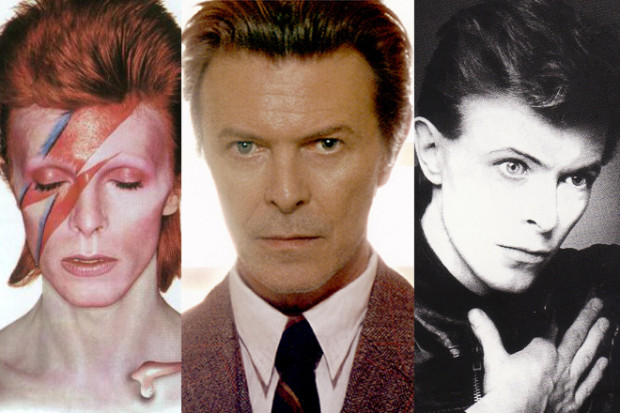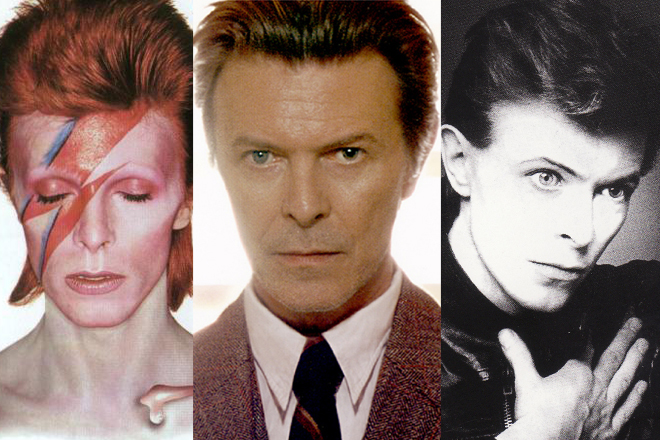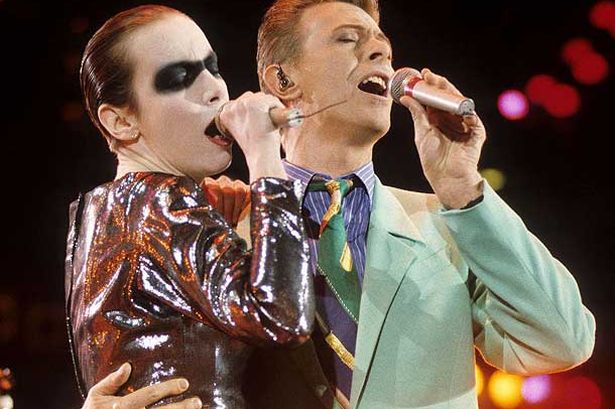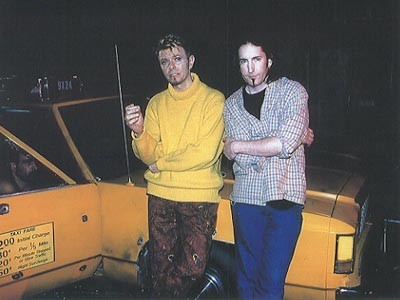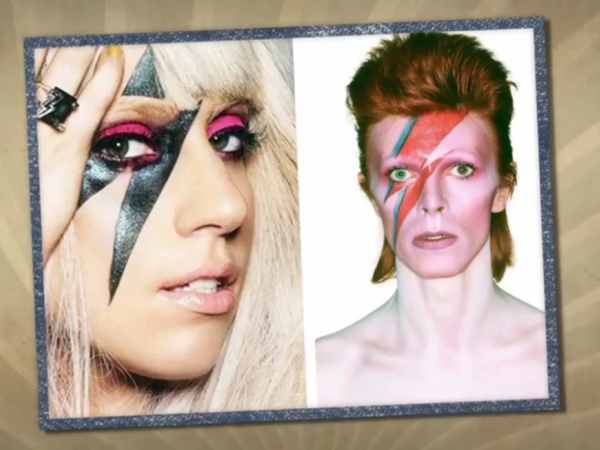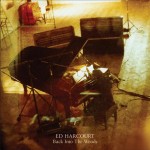David Bowie has been voted the most influential man in popular music, beating Elvis on more than one occasion. His chameleon like career is such an eclectic treasure trove of magpie influences absorbed, re-translated and carefully crafted into characters that challenged rock music orthodoxy time and time again. Like Dylan or the Beatles he pulled his own influences from music (Musichall, Glam, Krautrock, R&B, blue-eyed soul, avant-garde, disco, and latterly electronic, drum and bass, metal and industrial), and disparate stylistic and cultural influences that stretched from his androgynous ‘outsider’ playfulness through the Burroughs cut ups, Warhol’s Factory, Nietzsche and Kabuki theatre. In fact his back catalogue and dizzying transformations in look and sound are so impressive that it’s probably easier to say who HASN’T been influenced by the Thin White Duke in popular music. In my next piece on Bowie’s best collaborations I shall more closely look at his work with his key collaborators including Mick Ronson, Robert Fripp, Tony Visconti, Mott The Hoople,Iggy Pop, Brian Eno Lou Reed, and Nile Rodgers. But here we shall sketch out some of the key artists who cite Bowie as an influence and keep our ear open not just for how the ‘Bowie’ sound but how the tentacles of his unending creative ambition, artists creations, concept albums and constant breaking of the rules have inspired others….
Johnny Marr(The Smiths)
“David Bowie is easily the most influential and important artist to come out of the UK, for so many reasons – there are musicians who are influenced by him who don’t even realise it. ‘Ziggy Stardust’ and ‘Hunky Dory’ liberated so many people from the straight sensibility in the suburbs. People who I grew up admiring, like Pete Shelley from the Buzzcocks or Ian Curtis, were hugely influenced by Bowie. No Bowie, no John Lydon – or lots of other people.
I first heard of him in the glam rock days with the amazing run of RCA singles – I think ‘Suffragette City’ was played at my youth club. What was fantastic was that it was this tough, tight rock music, but the cool girls liked it, because back then, a lot of rock music was good guitar players but was just guy-zone – music for spotty, greasy boys. So many parents hated that ‘Ziggy Stardust’ and ‘Aladdin Sane’ period, because it was so obviously sexually loaded and erotic. That was really liberating. It was naughty, and it was exciting, and it was illicit. It was about a world that I just couldn’t wait to join – he really understood what a great artform commercial pop could be.” (Johnny Marr, NME 2013)
Ian Curtis and Joy Division
Like the Buzzcocks, Ian Curtis and Joy Division cited Bowie as a influence upon the Manchester bands debut ‘Unknown Pleasures’ and certainly if you listen closely to their dystopic washed out post punk spiky sound it has some echoes of Bowie and Eno’s, layered harmonizer laden, Berlin albums ‘Low’ and ‘Heroes’. And perhaps his productional collaboration with Iggy Pop on the Stooges ‘Raw Power’ and the singer’s debut album ‘The Idiot’. Originally named Warsaw, after the Low track ‘Warszawa,’ before the now synonymous band name change, their connection to Bowie was at first one way, yet it would later end up working both ways. During the recording of ‘Scary Monsters (and Super Creeps); Tony Visconti has talked about how recording the song and playing a rare early version: “We told Manhattan-based funk musicians to play like a British punk group,” says Visconti. The “British punk group” in question was almost certainly Joy Division, a Bowie favourite at the time. Scary Monsters has many points in common with She’s Lost Control, released the year before:
Whereas Ian Curtis is singing about his female character’s epilepsy, Bowie sings about a woman consumed by anxiety and claustrophobia, running amok, pursued by demons, monsters, creeps. Dennis Davis, Bowie’s drummer, is playing suspiciously Stephen Morris-like snare fills, as though someone has just played him the first Joy Division album right there at The Power Station. It’s the electronic syndrum-cowbell that punctuates both songs that really gives the game away, though. Some of the kudos should go to Martin Hannett, who produced She’s Lost Control and paid meticulous attention to the drum sounds. The Scary Monsters cowbell does such a similar tonal four-bar curve to Joy Division’s electronic snare that it’s hard not to think it must’ve been deliberate. But it was a completely legitimate payback; Joy Division had themselves drawn liberal inspiration from Bowie’s work with Iggy Pop.”
Source: http://www.network54.com/Forum/8980/thread/1268147916/1268182043/Bowie-Joy+Division
New Romaticism and the Synth Kids
David Bowie’s Berlin trilogy was a central influence for many of the post punks of the late seventies and synth outfits that emerged in the early to mid 1980s, it wasn’t just his androgynous look that inspired them but the sounds of his seminal melding of electronics, guitars and melody with Eno on the Krautrock influenced Low, Station to Station and Heroes. When a nascent Human League emerged spouting dystopic themes above minimal click tracks and futuristic bleeps in December 1978, David Bowie appeared in the audience and later declared to NME that he “had seen the future of pop music.’
When he sought out extras for the video for his self -referential comeback single Ashes to Ashes in 1980 he went directly to the Blitz club in London one of the homes of New Romanticism at the time, a place frequented by Steve Strange (Visage), Boy George (Culture Club) Martin Degville (later to be the frontman of Tony James’ Sigue Sigue Sputnik), and Spandau Ballet in this act of featuring ‘Blitz kids’ as extras in the video, he had lent not just his sound but his patronage to the movement that was to follow.
“David Bowie came to the club and hand-picked me to be in the Ashes To Ashes video. I was totally in awe. The makers asked me to meet them at 6.30pm at the Hilton Park Lane and I thought we would be going something really exotic. We ended up on Southend beach! He closed the beach, so at least that was glamorous. Bowie’s known as a very clever thief, that’s why he turned to the Blitz, because he wanted to be part of London’s most happening scene. Latterly, word spread and the press was trying to pin a name on to us. They variously called us The Cult With No Name and blitz kids. Finally they came up with new romantics.”~Steve Strange
Duran Duran, Depeche Mode and Bauhaus all drew strength from Bowie’s work in the 1980s, but perhaps the biggest Bowie fan of the crowd was one George Alan O’Dowd singer with Culture Club. Whilst his groups soulful reggae lite sound wasn’t comparable, Boy George’s shocking gender bending behaviour that made many do a double take when he first appeared on TOTPs with their debut hit ‘Do you really want to hurt me’ echo’d the outrage at Bowie’s Ziggy era displays of flamboyance and gender confusion. Only whilst Bowie’s sexual gender bending contained a hint of danger, Boy George would almost normalise cross dressing and bring it into the mainstream for many, thus until his drugs bust Boy George became a loveable panto dame opposed to Ziggy’s creature from another planet!…..
Whith Dave Steward musical skills and Annie Lennox‘s supple soulful vocal acrobatics the Eurythmics writing partnership proved successful and by 1982’s love is a stranger Lennox began playing with gender assuming a butch role and adopting a shocking red close cropped cut with a power business woman’s look that was a clear twist on Bowie’s Thin White Duke. While ‘Sweet Dreams’ also bore the hallmarks of the ‘Bowie sound’ of the mid 70s and early 80s with its insistent chirping synths, catchy lyrical motif and it’s impactful visual social commentary on the excesses of yuppies…
Gary Numan(The Tubeway Army)
With his futuristic from another planet look and a sound owing to the futurism of Bowie/Eno, The Tubeway Army‘s leader pale alien Gary Numan seemed a natural disciple of Bowie, even taking some of his staging and moves from Bowie’s detached ‘Station To Station’ period too. But the Dame slapped him down in an 1980 interview, something that took Numan a long time to get over given he was a childhood Bowie fan: “What Numan did he did excellently but in repetition, in the same information coming over again and again, once you’ve heard one piece…. It’s that false idea of hi-tech society and all that which is… doesn’t exist. I don’t think we’re anywhere near that sort of society. It’s a enormous myth that’s been perpetuated unfortunately, I guess, by readings of what I’ve done in that rock area at least, and in the consumer area television has an awful lot to answer for with its fabrication of the computer-world myth.“[By 1976]
Whatever Bowie’s misgivings it’s clear that electronic-pop pioneer Gary Numan wasn’t just a student of Bowie’s sound but his style, attitude and outsider ethos: “I’d caught up with the whole Bowie thing and was a big fan. I think I was 16 when I bought his Aladdin Sane album. I also started going to a gay club in London’s Poland Street called Louise’s. A group of us would travel up on the train to Louise’s, or to another London club, Crackers in Wardour Street, where we persuaded the gay management to let us have our own David Bowie night. The gay club was great, it was the only place you could go without being beaten up if you looked a little out of the ordinary.” Gary Numan, Praying to the Aliens: An Autobiography (1997), p.26
Here’s a prime cut from the Tubeway Army’s ‘Are Friends Electric?’ the echoes of Bowie’s time in Berlin are clear from the synth sound, to Bowie’s very ‘English’ singing style:
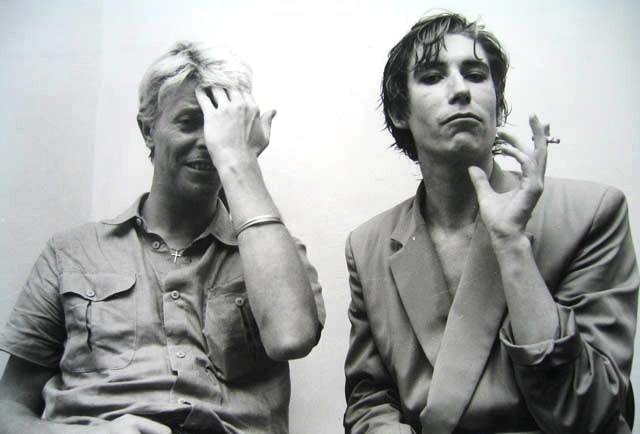
The Psychedelic Furs
UK avant-punk band The Psychedelic Furs‘s early work bore a startling resemblance to Bowie’s work of the 70s and 80s, it wasn’t just Richard Butler, the singer’s, vocal tone but some of their songs, with 1982’s ‘Love My Way’ featuring similar Asian rhythmic loops to Bowie’s ‘China Girl’. Bowie and Butler would meet in 1983 backstage at a gig in Sydney(pictured above). The Psychedelia Furs even shared collaborators, working with Giorgio Moroder (who worked with Bowie on Cat People) disciple Keith Forsey (drummer, producer, co-writer of Flashdance) as their producer. Shifting considerably from post punk in the late 70s to more new wave pop in the 80s, The Furs would later go on to greater commercial success with the likes of ‘Heartbreak Beat’ and ‘Pretty In Pink’…
https://youtu.be/LGD9i718kBU
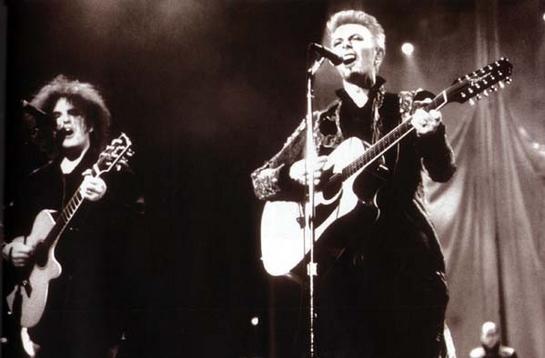
Robert Smith(The Cure)
The Cure‘s gothic band leader Robert Smith has often cited David Bowie as a key influence in his music career, the first record he bought was the iconoclastic outsider album Ziggy Stardust. Smith has cited Bowie’s Eno produced masterpiece “Low” that saw Bowie’s icy vocals and jagged reflection born of his recovery from cocaine addition, as one of his key influences and was a touchstone for the sound of the Cure’s “17 Seconds” LP. Taken from that album is the haunted brittle post punk masterpiece ‘Play for today’. Robert Smith would later join Bowie on stage for a renditions of ‘Quicksand’ and ‘Breaking Glass’ at his 50th birthday celebration in New York City in 1997,….
“David Bowie’s Low is the greatest record ever made. I bought it on cassette and the same day I went to a garden centre with my mum. I’d ordered it from the local record shop, and Paul, who was in the band, and is my brother-in-law, had dropped it through the letterbox. It’s like one of those weird days. I walked home from school, there was the cassette and we had a cassette player in the car. I went with her to a garden centre, and I listened to ‘Low’ while she went and did whatever mums do in garden centres, and I was like utterly, my whole perception of sound was changed. Just how something could sound completely different, like ‘Breaking Glass‘, everything on there in fact, ‘Sound And Vision‘, everything on there, everything I heard was astonishing, really astonishing. When I put it on now the sound, dunk dunk, everything is just fucking genius! There are other albums that I love much more, like viscerally much more, like ‘Axis: Bold As Love’, or ‘Five Leaves Left’, albums that I can cry to, but ‘Low’ was the album that had a huge impact on me, just how I saw sound. No other album has done that to me.” (Robert Smith of the Cure to the NME 2012).
Grace Jones
Jones’ outrageously shape shifting style and sound bares the hallmarks of Bowie’s 70s and 80s work, indeed the two allegedly had a dalliance at one point but we can’t confirm that. Her sleek masculine feminine look, and pulling of avant influences from dance, fashion, jazz and soul she crafted a bricolage of sounds that are stolen from by the likes of Lady GaGa and Rihanna in 2013.
Suede (Brett Anderson/Bernard Butler)
Early Suede owes a great debt to Bowie, its sneering suburban tales of sexual psycho-drama of songs like ‘Animal Nitrate’ and ‘Metal Mickey’, from Brett Anderon’s long hair, and arse-mic slapping on stage antics and ambiguous pronouncements upon his sexuality that echoed Bowie’s own, even Anderson’s Laarrndarrn twang also pitched itself somewhere between the high camp of Bowie and the knowing irony of Morrissey. Indeed the track ‘The Drowners’ is said to hint at Bowie’s influence becoming perhaps too pervasive with Anderson singing ‘stop taking me overrr’ it would be their concept album 1994’s Dog Man Star that ironically saw Suede step out of from Bowie’s shadow. While epics like Stay Together, the sweeping balladry of ‘The Wild Ones’ are communal outsider anthems that echo Bowie’s ‘Changes’ , ‘Heroes’ and ‘Rock and Roll Suicide’ ‘you’re wonderful; indeed.”
“Suede have always had a very strong sense of where we came from. I find England strange and unique and beautiful, and I think that’s why I was initially attracted to Bowie. People assume I love ‘Ziggy Stardust’, but my favourite David Bowie albums are “Heroes” and ‘Low’.” (Brett Anderson)
Supergrass
Cheeky scamps Supergrass may have emerged as bright-eye’d and bushy tailed Kinks like tunesmiths, but it was the Glam pop of their self titled album that not only tipped its hat to the vibrant fuzz pop of T-Rex, but its lead single ‘Pumping On Your Stereo’ is an apparently unintentional yet playfully addictive homage to Bowie classic ‘Rebel Rebel’. “I started off playing it on the piano,” Gaz explains in an interview, “and I turned to Mickey and went ‘That’s really Bowie’. He started playing bass, (keyboard player) Rob took over the piano and I started playing guitar. But even though I’d said it was like Bowie, we didn’t build on that. I suppose, in a way we’re not aware of it. It’s only when it comes out and people do start saying stuff like that. It’s a dangerous area to get into, if you ever are conscious of it. I mean, I don’t appreciate it when you hear bands and you hear too much of something.” It’s more the spirit of the song though, rather than ripping off three chords or whatever. “Yeah, that’s what I thought. It’s the vibey stuff like handclaps, things that make you think, well we’re just in there really wrecked and doing what comes naturally.”
Blur(Damon Albarn)
Blur are another 1990s band whose debt to Bowie stretches to the duke’s now forgotten about self titled debut album of 1967 and the cockney musichall character songs like ‘Little “Little Bombardier” ‘ and ‘Uncle Arthur’ are similar to Albarn’s non conformist cacitatures on Parklife and Modern Life is Rubbish (“Tracy Jacks and “Ernold Sane”). While latterly the influence became a little more clear cut on Blur’s ‘MOR‘ that stole so obviously from ‘Boys Keep Swinging’ that Eno/Bowie had to be given a credit while the Oh You Pretty Things rip off All Your Life. Blur’s deadly enemies fell foul of Bowie’s legal team when the “all the young blues” line in ‘Whatever’ and their song ‘Stand By Me’ borrowed a little too readily from All The Young Dudes. Albarn’s restless creative spirit post-Blur with Gorillaz, The Good The Bad The Dead and various projects in Africa draw clear parallels with Bowie’s unquenchable and ever shifting quest for inspiration and collaboration too…
(Kurt Cobain) Nirvana
Nirvana covering The Man Who Sold the World on Unplugged was in 1993 considered surprising given Bowie’s image in America as a sexually questioning Dandy that it wouldn’t be received that well by the ‘jocks’ who now bought Nirvana’s records in their millions. But Kurt Cobain was a longtime fan of Bowie and the Beatles and also professed his love for “gender bending” by wearing eyeliner and leaving his hair permanently long. But it was the music that mattered after all ‘The Man Who Sold The World” was a Bowie classic and Nirvana’s raw strum, stripped the song back to its core and revealed its true majesty to a new audience.
Pulp(Jarvis Cocker)
Maybe the early sound of Sheffield bedsit-indie band Pulp was more indebted to 70s kitsch and Roxy Music. But it wasn’t just Jarvis Cocker‘s vocals in Pulp’s latter years that became more Bowie like in their croon on their last Scott Waker produced album ‘We Love Life.’ But Jarv’s neurotic witty-preoccupation with suburbia and sexual dysfunction, especially on albums like ‘His n Hers’ and ‘This is Hardcore’, which echoes the sophisticated double meanings in the Bowie’s lyrics.
Mansun (Paul Draper)
Chester’s Mansun formed around guitarist/vocalist Paul Draper in the mid-’90s. Draper met Stove King (bass) at Wrexham Art College, discovering that the pair shared a fondness for new wave acts like Duran Duran and ABC, as well as Prince, Pink Floyd, and David Bowie. And it showed on their first chart topping album with its dark, grandly romantic anthems like ‘Wide Open Space’ and witty synth laden songs like ‘Stripper Vicar‘. By their album ‘Six’ the group had taken an all together more fragmented almost prog influenced approach to songwriting. But it was their last album ‘Little Kix’ when the influence of the Dame became clear on the track ‘Fool’ with its amalgamation of ‘Let’s Dance’ and ‘China Girl’s enveloping chorus line…
Draper states in the liner notes of Legacy: The Best of Mansun that “Fool” was intended as a throwaway Jimmy Webb track. He explains that reading a book on song writing by Jimmy Webb: “Inspired me to write an ironic song that is now my least favourite Mansun track. Bowie intro, comical chorus lyrics and guess what? The label wanted it as a fucking single! I couldn’t believe it!”
Radiohead
Bowie’s influence didn’t just stretch to his style, or sound but to his concepts too, his dystopic vision of the future that commented on the present on albums like ‘Hunky Dory’, ‘Ziggy Stardust and the Spider’s from Mars’ and ‘Low’ didn’t just strike a note musically but thematically bands have been influenced to create similar statements ever since. The claustrophobia of Radiohead’s Ok Computer, was a concept album for the end of the 1990s that captured a similar alienated fear of technology that Ziggy Stardust did, while follow-up Kid A would, like Bowie had done on countless occasions, shatter all preconceived notions of who they were as an ‘alternative’ band, and how they could sound.ED O’BRIEN (RADIOHEAD)
“I just admire David Bowie in the ‘ 70’s. He was on a mission. His albums were hit and miss sometimes, but he was brilliant because of that.”
Trent Reznor (Nine Inch Nails)
Bowie’s influence upon US alternative music and the gothic and industrial metal of the 90s and 00s is undoubted, his outsider personas, the minimal synth heavy dystopic sounds of albums like ‘Low’ and ‘Heroes’ provided an inspiration for artists like Trent Reznor. Nine Inch Nails Year Zero’s apocalyptic soundscapes, echoe’d the dread in Stardust opener “Five Years” while Bowie’s unquenchable experimenting thirst can also be witnessed in Reznor’s own restless career .
“One of my biggest heroes and people I was fortunate enough to be around is David Bowie. I look at his career, and he always had the balls to break things that weren’t broken, to step away from something and try something new, at risk of failing.” -Trent Reznor
Bowie would later tour with Nine Inch Nails across North America in 1995 performing a version of the bands Hurt with Reznor. Others like Billy Corgan, Brian Molko and Marilyn Manson all took solice from the work of the Dame. Manson took the influence one stage further creating his own alter ego that nightmarish commented upon the pre-millienial tension and angst in America littered with High School shootings on an album ;like ‘Mechanical Animals’ which he called an amalgamation of ‘Numan’ and ‘Bowie’.
“Today there seems to be a lack of icons and rock stars in general. When I grew up, there was David Bowie and Iggy Pop — people who had something to say and had quite an impact on music and society.” Marilyn Manson
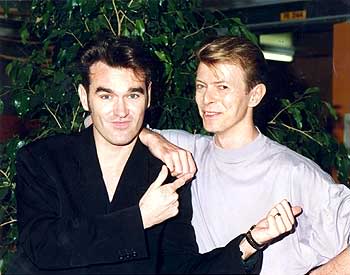
Morrissey (The Smiths)
In one of his 1970s letters Morrissey noted that he’d seen Bowie perform 14 times between 1972 and 1976 alone. To an awkward bookish-teenage Morrissey, Bowie was once a god: “He was so important to me because his vocal melodies were so strong and his appearance was so confrontational,” Morrissey recalled in 2009. “Manchester then was full of bootboys and skinheads and macho-macho thugs, but I saw Bowie’s appearance as the ultimate bravery. To me, it took guts to be David Bowie, not to be a shit-kicking skinhead in a pack.” When Morrissey bought the “Starman” single in the summer of 1972, he “fell in love with the potency of the pop moment…the pop moment in my life was the only thing that ever spoke to me.” It was perhaps natural Bowie’s ethereal mannered croon and songs that name checked pop and literate icons would be a touchstone for a young Morrissey…
When Morrissey met Bowie for the first time in Manchester years later, backstage at a “Sound + Vision” show in August 1990. By that time the Smiths has disbanded and Morrissey, was now a solo artist, with four UK top 10 hits. As if to anoint Morrissey as the heir to his throne. one night in June 1991, as Morrissey was playing the Inglewood Forum in Los Angeles, Bowie came on stage to sing T. Rex’s “Cosmic Dancer” with him. In 1993, when Bowie covered a Morrissey song on Black Tie White Noise, with, again, another glam legend roped into the proceedings. Bowie sang “I Know It’s Gonna Happen Someday,” a song originally produced and arranged by Mick Ronson and that bore tribute to Bowie’s ‘Drive In Saturday’ a song that Morrissey would go on to record himself. This led to a ill-fated tour with Bowie on his Outside tour of 1995 when playing to poor crowds and gaining mixed reviews Morrissey simply upt and left the tour. Since then both artists have disagreed about the events and are still feuding to this day with Morrissey’s attempts to gain a Bowie image for one of the cover art for the forthcoming reissue of ‘The Last of the Famous International Playboys’ being blocked by the Dame. A sad tale but perhaps it was inevitable given that both are Divas eh?
“He was a fascinating artist in 71 or 72 not now…'(Morrissey on Bowie)
1998 Bowie And Morrissey by Theleetsoldier
David Sylvian(Japan)
It wasn’t just David Sylvian‘s voice that bore resemblance to the Dame but the lead singer of Japan,solo work sought similar references too. A reference to Günter Grass’s baroque tale of Poland under Nazism (and Volker Schlöndorff’s cinematic adaptation of it), “Tin Drum” takes a lead from “Low”, as well as from the avant-garde composer Karlheinz Stockhausen, to create an eerie euro atmosphere of East Asian influences. On the album’s biggest hit, “Ghosts,” one detects the halting rhythms of one of Bowie’s latter references Kabuki music amongst this stylish blend of synthesized music and asian instrumentation.
Beck
Although you can’t really detect the ‘Bowie Sound’ in much of his multicolored back catologue, Beck has often cited Bowie’s restless creative spirit as an inspiration in his genre hopping work that leapt from white boy hip hop to psych folk to funky soul jams. As if to emphasis his love for the Dame Beck performed a novel “re-imagining” of Sound And Vision with a huge 157 piece orchestra recently at a one-off event in LA.
David Bowie’s influence has stretched into the noughties, in an echo of Bowie’s Berlin treble: in 2010 pop star Robyn released a trilogy of albums throughout the year known as Body Talk.
While at the other end of the musical spectrum clever indie-troupe Of Montreal’s Hissing Fauna album was a darkly contemplative concept album with a crafty-synth laden witty glam sound that owes to Bowie albums like ‘Hunky Dory’, ‘Ziggy’, ‘Alladin Sane’ and the funky basslines of the track ‘Gronlandic’ are redolent of Bowie’s ‘Fashion’…
Lady Gaga
While many look towards her similarity with Madonna, probably the world’s biggest current pop star Lady Gaga is subsumed more with the artifice and look of Bowie rather than his sound, indeed like prime-Bowie era even echo’d Bowie’s Alladin Sane flash make up look(pictured above) she has looked to interpreted her stylistic influences and create an artifice and image fashioned for a modern MTV audience. In an interview GaGa stated that: ‘I used to like sit in my apartment for hours and do his make-up on myself over and over again.’ She continues with ‘what I have in common with David Bowie is the way that I combine theatrics and the visual in all of my performances. The fashion and the imagery and what I am trying to say as an artist goes much further beyond the music… the intention for me is not to sound just like Bowie. It is to pull references from all these different people and create something fresh and new and futuristic and pop and different.’ Ga ga’s furturistic robo image she has presented an almost a-sexual caricature turning the tables on gender roles in her videos often taking the masculine role and singing in a more masculine deeper voice, thus carrying on the tradition of gender bending.
Arcade Fire
Canadian orch-rock troupe Arcade Fire cited David Bowie’s Berlin trilogy of albums, Low, Heroes and Lodger as an influence upon their debut album ‘Funeral’ so much so that David joined the band for a rousing rendition of their song Wake Up in 2005.It has the same tempo and anthemic feel of “All the Young Dudes”, which Bowie wrote,but was rearranged by Mott the Hoople.
“So much of the pop and rock made during the last 35 years carries Bowie’s thumbprint that he is a charter member of a small but select group who shortlist for the title of Most Influential Living Musician, alongside Dylan, McCartney, Stevie Wonder and — if we throw heavy rock into the mix — Jimmy Page. Who else’s influence was apparent in both punk and soul, on Madonna and Jarvis Cocker; on Oasis and Phillip Glass alike? Who else has duetted with Bing Crosby and dabbled in drum-and-bass, recorded with both Stevie Ray Vaughan and the Pet Shop Boys, produced both Lou Reed and Lulu?” Charles Shaar Murray
Key artists influenced by David Bowie:
Marc Bolan and T. Rex, Mott The Hoople, New York Dolls, The Sex Pistols, Iggy Pop, Morrissey, Bauhaus, Gary Numan, New Romantics, Culture Club, Depeche Mode, Soft Cell, Duran Duran, Visage, OMD, Japan, Bauhaus, Joy Division, The Buzzcocks, Paul Weller, Psychedelic Furs, Grace Jones, Madonna, Pet Shop Boys,Visage, Echo and the Bunnymen, The Cure, Suede, Pulp, Placebo, Blur, Pulp, Supergrass, Breeders, The Smashing Pumpkins, Mansun, Placebo, NIN, Radiohead, Bjork, Patrick Wolf, Beck, Moby, LCD Soundsystem The Killers, Sufjan Stevens, Arcade Fire, Lady GaGa, Robyn, Of Montreal, Lorde
